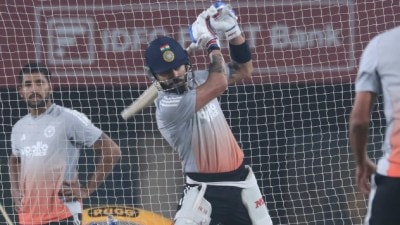Saying Amars hands unclean,SC lifts gag order on his tapes
This court wants to make it clear that an action at law is not a game of chess
Coming to court with unclean hands,to only shift his stand to suit his convenience,cost former Samajwadi Party leader Amar Singh today,with the Supreme Court lifting a five-year-old ban on publication of the infamous tapes of his tapped conversations.
On February 27,2006,the Supreme Court had imposed an interim gag order on the publication of the conversations,allegedly between Singh and several prominent personalities,on a petition by the leader that such illegal interception of his phone lines amounted to intrusion of his privacy.
This court wants to make it clear that an action at law is not a game of chess. A litigant who comes to court and invokes its writ jurisdiction must come with clean hands. This court has no hesitation in holding that the instant petition is an attempt by Singh to mislead the court on the basis of frivolous allegations and by suppression of material facts, a bench of Justices G S Singhvi and A K Ganguly observed in their judgment.
This court therefore dismisses the writ petition and vacates the interim order, the court said,even questioning how the Supreme Court had given a stay order in 2006 itself.
Amar Singh refused to comment on the order,postponing a press conference he had called for today till tomorrow. I have not seen the order,I have not got it. Let me get the details,then I will definitely comment on it, he said.
In February 2006,Singh had moved the apex court levelling a very serious charge that the government had intercepted his phone at the behest of the ruling Congress party.
The Congress was even made a party in the Supreme Court litigation for acting out of a political vendetta and exercising its influence on the Delhi Police administration to intercept telephone lines of various political leaders of the Opposition,including that of Singh.
But on February 2,2011,Singh did a complete U-turn to absolve the Congress of any involvement in the controversy. In a detailed affidavit,argued by senior advocate and Congress spokesperson Abhishek Manu Singhvi,he withdrew his allegations against the party.
This,the Supreme Court described,was a very strange thing. Especially,when Singh had strongly protested in 2006 even against the courts suggestion that the Congress had been impleaded unnecessarily.
In his 2011 affidavit,Singh said he wanted to remove all averments,contentions and allegations against Respondent 7 (Congress party).
The affidavit of February 2011 completely knocks the bottom out of his case, the court observed.
As a reason for his shift in stand,Singh referred to the police investigations and trial of four persons who were arrested for the illegal tap.
On an FIR filed by Singh on December 8,2005,the police had found that Singhs service provider,Reliance Infocomm Ltd,had agreed to intercept his lines on the basis of two forged documents authorising the tap.
The first authorisation letter was from the Joint Commissioner of Police on October 22,2005,and the second from the Principal Secretary,Delhi,dated November 9,2005. Four persons,including the mastermind behind the operation,one Anurag Singh,was arrested and is currently being tried in a Delhi court. So far,only one witness has been examined.
Interestingly,the court registered its shock on the fact that Singh had actually filed his 2006 petition on the basis of documents handed over to him by Anurag Singh.
Now when the matter comes up for contested hearing,he (Singh) suddenly withdraws his allegations against the Congress party and feels satisfied with the investigation of the police in connection with the forgery case and also states that the same Anurag Singh edited and tampered certain conversations of Singh, the court observed.
Noting that the entire writ petition is based on records provided to Singh by an accused,the bench held that such litigants who come with unclean hands are not entitled to be heard on the merits of their case.
Observing that Singh could separately proceed against Reliance,the bench said the service provider had failed in its public duty by not checking the veractiy of the two forged letters.
This court is of the opinion that the service provider has to act as a responsible agency and cannot act on any communication. As a service provider,it is its inherent duty to act carefully and with a sense of responsibility, the court said.



- 01
- 02
- 03
- 04
- 05




























